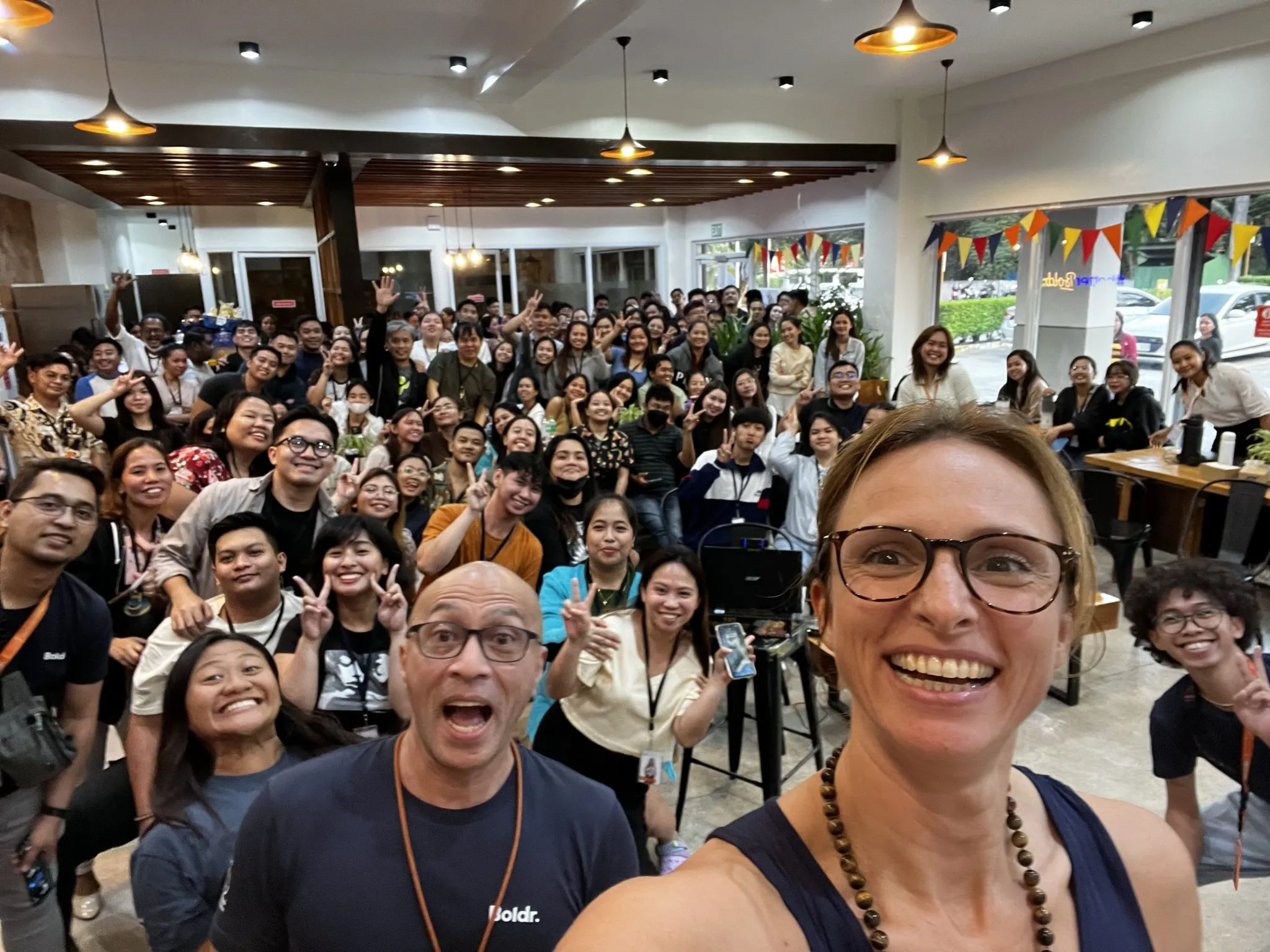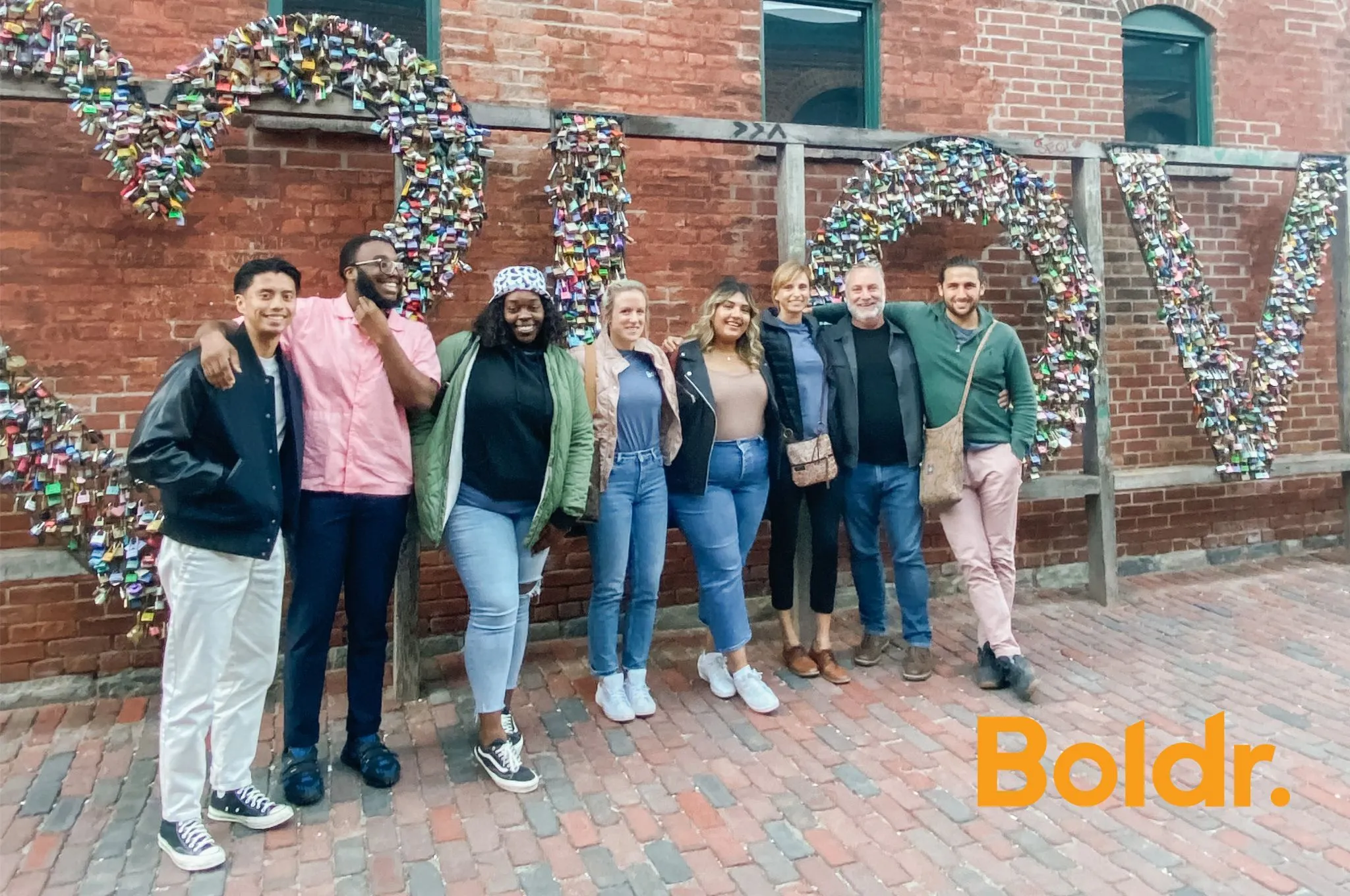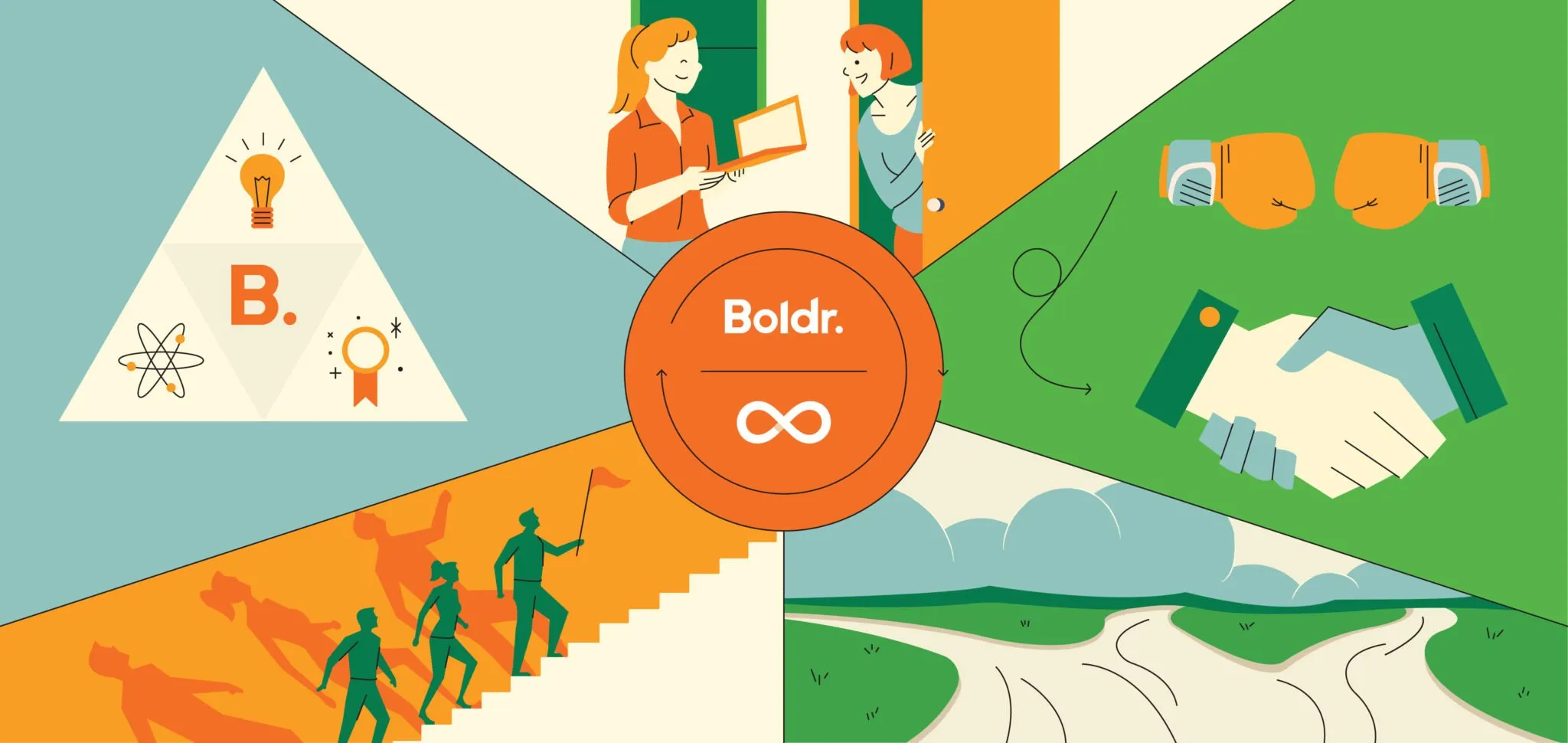What are the deeper foundational principles that drive and shape a company’s destiny? We sat down (virtually) with Mari Parker, Boldr’s Chief Operating Officer (and Chief Operating Mom of her two boys!) to talk about the fundamental role of core values in a company and how these served as Boldr’s “anchors“ and North Star through the company’s continued growth and especially through critical points in its journey.
This transcript has been edited for length and clarity.
Core values as a “shared language” and a “North Star”
Glo: One of the ways we create awareness into how we do things in Boldr and what makes us such a wonderful company to work for is getting to the foundations of what we call our core values. The first question is, why is having core values important?
Mari: There’s inherent value in having a shared language that you can use to create a culture within a company. For me personally having these core values, it’s almost like there’s a North Star or little cheat sheet of how we know if our team members are living the values.
How do you know if we’re creating and sustainably scaling a culture that is aligned with our personal values? I do think that in a lot of companies you will find that when values are successfully implemented in a company, they are usually reflective of the personal values of the leaders of that organization.
Setting it up in a way where the leaders can live by those values, just by being their authentic selves, allows space for them to lead by example. Naturally, it shouldn’t be something that’s difficult to do, and then it creates this guideline of: How do we operate? And who are we? And what does it mean to put within the Boldr culture? Or how do we define a Boldr culture?
Excellence, Authenticity, Empathy, Curiosity, and Dynamism
Glo: You’ve alluded to the Boldr culture and team members and our leaders adopting and living it out. For those of our viewers who may not be familiar, what are Boldr’s core values and what do they mean to you?
Mari: We used to have just three until recently, and now we have five core values. The first one is excellence. And the statement that we have built this around is that our success combines ambitious vision with operational excellence.
This means that there’s room for pushing boundaries and striving for excellence in how we deliver. This is how we deliver to our clients, how we support our team members, creating space for us to hold each other accountable. For leaders and anybody in the organization to take responsibility to feel really proud about the work they’re doing and do the best that they can do, not because somebody is watching, not because there’s a KPI that’s being measured, but because this is the right thing to do. For that to become intrinsic in how we operate is going to be foundational to continuing to deliver the best for all of our stakeholders, our clients or our team members in our community.
The second one is around authenticity. Our statement is that our best connections start with authenticity.
I do believe in allowing space for every person to show up in their authentic self and not have to come into an organization or into a group thinking that they need to filter in order to find belonging. It makes me think of that Brene Brown quote, around belonging, and how fitting in is actually the opposite of belonging, because to fit in, you assess a group, and you think, what do I need to alter or change about who I am in order for me to fit in there. Whereas belonging is knowing that you can be your full self and be accepted. Creating an environment that is conducive to team members showing up as their full selves, takes away that energy leakage of not having to worry about how I’m presenting myself, and am I using the right words. So that’s been really core to who we are. I think that’s the value that our team members resonate with most.
The third one is around empathy. At the heart of great partnerships, you will always find empathy.
This is really around designing with empathy in mind. In everything we do and everything we create. Have we taken a moment to really understand who’s going to be receiving this? How are they going to be receiving this? And what are their true needs? We can have the best intentions, and send a really thoughtful gift to somebody for their birthday. But if you didn’t take a moment to understand what they really need or want, you could miss the mark. That’s kind of a missed opportunity, right? We can have good intentions and be good people, but if we lack that empathy of just taking a moment to understand somebody’s needs, our clients or team members or community, we could be again wasting energy and not having the impact that we desire to have on these parties.
The fourth one is around curiosity. We do our best work by being curious.
We believe in being lifelong learners. We want our team members to constantly strive to learn and grow and challenge themselves, and to approach a challenge with curiosity. I think it shifts your perspective on challenging situations for something to go from being a problem to a challenge. It just requires a little bit of curiosity to ask Why? How did this happen? Why did this happen? What do I get to learn from this?
And then our last one is dynamic. We grow by remaining dynamic. We’re in a high-growth company. We are in a dynamic market. Just being able to adapt to our environment and to be outspoken about things we can take on and how we can help each other, it’s important.
Glo: If you had to pick, which one is your favorite one?
Mari: That’s a tough one. But I’m gonna choose curiosity today because I think there’s room for moving things forward in such a creative way. There’s room for so much more creativity in how we approach things if we just come at a situation with authentic curiosity.
When you step into a situation believing you are right and wanting to be heard before being understood and wanting to prove that you’re right, you can bulldoze your way through things and achieve your mission. But I don’t know that you’re going to get to the most creative solution. There could be solutions on the table that you didn’t even consider. By approaching these things with curiosity, you’re expanding the world of possibilities and at the same time, creating opportunities for the people around you to actually feel included in the solution design and take ownership in a unique way.
Core values in action: Navigating a crisis with empathy, curiosity, dynamism, and excellence for all stakeholders
Glo: Off the top of your head what is a story or a point in Boldr’s history where the application of these core values was evident?
Mari: I think the pandemic is a good example. I do believe that as an individual and as a company when you are put under a stressful situation like that, that’s when your true values shine. That’s when who you really are at your core comes to the surface, being under pressure in that moment. I want to give respect to the leadership that was with us. During that time we all looked to each other. There’s a system around this. You’ve got your purpose as a company, you have your key stakeholders and your values. All these things work together as a system. We did lean on our values. We leaned very heavily on the prioritization that we’ve set very intentionally, of who our key stakeholders are.
There’s a picture in our marketing materials of creating circular value across our three C’s. Those are Careers, Community, and Clients, with Careers referring to our team members. When we say this, we always say it in the order of our team members, our clients, and our community. It’s with the understanding that when we prioritize our team members and put them first, we know that they’re going to deliver for our clients in a way that’s going to create sustainable growth and allow us to continue to invest in the communities in which we operate. We stuck with this during the pandemic, pretty aggressively, where we approached our clients with a ton of empathy and curiosity to understand how this is impacting your business. How can we support you through this in a way that protects our team members’ employment as much as we possibly can?
There was one time in particular when we did not expect clients to honor their contract with us. We were open to the situation and the economic impact that this circumstance had on them as a business. While understanding that, we would let clients out of their contractual obligations and come up with really creative solutions to say “Hey, we can reduce your team by a certain size, or I know, you still need this work done. And it’s going to be detrimental to your business if you don’t have the support. How about I keep that support in place that keeps the team members employed, but reduce your cost to just share the cost to cover our costs? And we’re not going to make a profit off of that”
We were able to get through the pandemic with some clients in that circumstance. As they opened up again, and they grew, our partnership with them recovered and grew to something that is sustainable, and scalable. That’s a really beautiful example of how we could have just stood our ground and said “No, you have to pay for this whole thing.” And it would have been to the detriment of that company, and probably wouldn’t have served anybody. We could have just said. “Oh, we’re gonna do everything for the client. We’re just gonna listen to their instructions without any questions. Okay, we’re shutting the team down.” But instead, we engaged in a conversation. We applied curiosity. We were super dynamic in being flexible with how we looked at our team structure. We were empathetic to the client’s situation while being empathetic to our team members’ situation. We maintained the service level and proved that we would be your partner through thick and thin. That we’ll get through the hard times, just as we celebrate the good times.
Practical applications and benefits of core values to organizations
Glo: One of the questions speaks to the tangible benefits of having core values. There may be a perception that core values are fluffy or are just nice to have. But it sounds like something really foundational!
Mari: In launching these values, that question came up; how important is this and how critical, as we were with others, that stuff, we need to do? It got really clear, really quickly, through a few conversations that this stuff is foundational. Because once you’ve set these core values, it’s based on this.
You are going to create every policy that we have in the company, every procedure that we create, for instance when we design a solution for our clients, any document that gets written, I should be able to test against this, or how we hire team members. So we’ve integrated this into our recruitment or talent acquisition process, and it’s part of the questions we asked to make sure the team members who come in are actually going to find a sense of belonging with Boldr because they do align with our core values.
How we measure the performance of our team members in our performance appraisal process. You get to use this as a guideline to say, “Hey, you might need some support here, because I’ve noticed that there’s been a struggle or a challenge. And, how can I support you?” And you can lean on the definitions and the expectations around these values. There’s a clear guideline on how to support team members, how to articulate expectations to them, and how to set some standards in every part of the business for our team members, for our clients in terms of how they support our team members, or policies or procedures.
Why should companies consider having their own core values?
Glo: What advice would you give companies that have yet to form their core values or are in the process of thinking about their core values?
Mari: There are two or three layers to it. One is starting with your own personal core values. It makes a lot of sense, especially as the leaders in the organization. Setting yourself up for success, to being able to live these values authentically, is important. At the same time, it is important to be somewhat aspirational as well. What are the attributes that you want to be shown in the organization? How do you want people to behave? It’s going to drive behavior and attention to where you’re going to see results.
Being intentional about the words that you use can take a bit of time. So, be patient with yourself to get that right and feel really good about the words that you use to describe these values. And then be real about what it takes to be really embedded in an organization. It is really not as simple as writing it on your website or having it in a form some remember got sent out.
It takes you bringing it into every conversation, leaning on it as a decision-making framework when there are discussions being had, and bringing it into your meeting structures. Using it as a guideline or a foundation for how you create almost everything in the business. I think it’s important for you to really become embedded in who you are in order for you to see the results of it as well. So, be patient, be authentic about it, and be aspirational at the same time.


